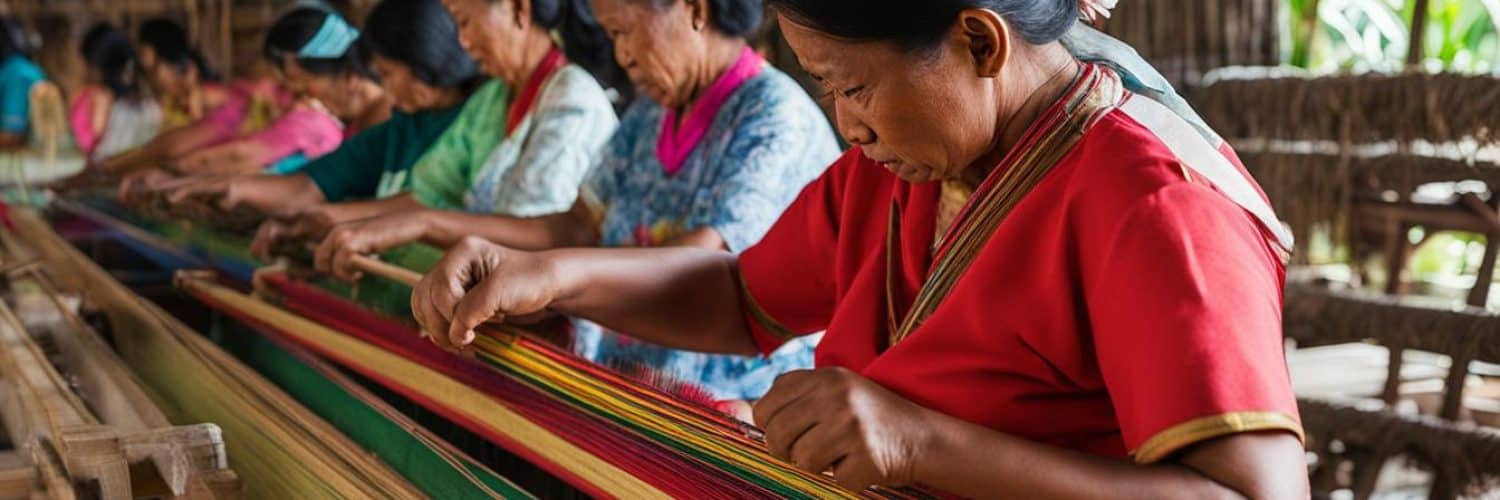Experience the rich cultural heritage of traditional weaving at the Basey Weaving Center in Samar, Philippines. Nestled in the charming town of Basey, this weaving center is renowned for its exquisite handmade textiles and the intricate craftsmanship of its weavers.
Basey, Samar, is a place where the art of traditional weaving comes alive. The town is immersed in a weaving tradition that has been passed down through generations, making it a hub for local weaving enthusiasts. Explore the vibrant world of Basey’s weaving center and immerse yourself in the time-honored techniques that have made this place so special.
Key Takeaways:
- Basey Traditional Weaving Center in Samar, Philippines offers a glimpse into the world of traditional weaving.
- The town of Basey is known for its rich weaving heritage and intricate handmade textiles.
- Basey’s weaving center is a hub for local weaving enthusiasts, showcasing the craftsmanship of its weavers.
- Explore the vibrant world of Basey’s weaving center and discover the time-honored techniques of traditional weaving.
- Immerse yourself in the cultural heritage of Basey’s weaving tradition and experience the beauty of handmade textiles.
The Weaving Tradition in Basey
The weaving tradition in Basey, Samar, is deeply rooted in the town’s cultural heritage. Passed down from generation to generation, this centuries-old tradition has become a way of life for the people of Basey. Traditional weaving, also known as Basey weaving or Samareño weaving, involves the intricate art of creating textiles using sedge grass called tikog.
This traditional textile is renowned for its durability and vibrant colors. The women of Basey skillfully weave the tikog into intricately designed mats that serve various purposes. While these mats are widely used as sleeping mats, they are also transformed into a range of products, including bags, slippers, furniture matting, dividers, and even lampshades.
The weavers of Basey understand the value of preserving their cultural heritage through traditional weaving, and their commitment to this craft is evident in the exquisite designs and craftsmanship displayed in their creations.
From Sleeping Mats to Diverse Products
Although sleeping mats are the traditional output of Basey weaving, the weavers have expanded their repertoire to include a diverse range of products that serve both practical and decorative purposes. These products showcase the weavers’ creativity and adaptability, incorporating modern designs and vibrant colors into their traditional craft.
With their meticulous attention to detail and mastery of Basey weaving techniques, the weavers produce bags, wallets, gadget sleeves, wall decors, and even vintas, traditional Filipino sailboats, all made from the tikog mats.
These banig products from Basey are highly sought after as unique and meaningful souvenirs, capturing the essence of traditional weaving while reflecting the contemporary tastes of customers.
A Way of Life
Basey weaving is not just an industry or a craft; it is an integral part of the daily lives of the people in the town. Weaving has been ingrained in the culture of Basey, shaping their traditions, livelihoods, and community interactions.
“Weaving is a way for us to connect with our roots, express our creativity, and support our families,” says Elena, a skilled weaver from Basey. “It’s not just about making mats; it’s about preserving our heritage and passing it on to the next generation.”
The weaving tradition in Basey is not only a means of economic sustenance but also a source of pride and identity. By continuing this cultural practice, the weavers of Basey contribute to the preservation and promotion of the rich weaving heritage of Samar, Philippines.
World Record Mat Weaving
In 2000, the people of Basey achieved a remarkable feat by creating the world’s longest mat. Stretching for more than a kilometer, this extraordinary mat, known as “banig,” was a testament to the incredible skills and dedication of the weavers in Basey Traditional Weaving Center.
The mat was meticulously crafted by groups of weavers from different barangays of Basey using tikog, a type of sedge grass that grows abundantly in the marshlands of Samar. Although the mat was not officially submitted to the Guinness Book of World Records, it was a moment of immense pride for the people of Basey and a striking display of their craftsmanship.
This impressive world record mat weaving showcased the artistry and expertise honed through generations of banig weaving in Basey. It demonstrated the weavers’ unwavering commitment to preserving their cultural heritage and producing exceptional handwoven products.
Below is an image that captures the magnificent world record mat weaving:
Recognition and Awards
In 2011, Delza Morales, the proprietor of Delza’s Native Products in Basey, Samar, received the prestigious Gawad Ginintuang Award for her exceptional entrepreneurial achievements and contribution to the Philippine economy through her weaving and bag-making business.
Delza’s Native Products is a renowned establishment that specializes in producing high-quality indigenous products, showcasing the artistry and skill of the local weavers in Basey. The Gawad Ginintuang Award recognized the significant impact of Delza’s business on the livelihoods of women’s groups in the community, providing them with valuable opportunities and sustaining their cultural heritage.
This recognition not only highlights the importance of Basey weaving in preserving indigenous knowledge and heritage but also underlines its contribution to the local economy. Delza’s Native Products has played a vital role in promoting and sustaining the weaving industry in Basey, ensuring that the tradition continues to thrive for generations to come.
The Gawad Ginintuang Award recognized the exceptional entrepreneurial achievements of Delza Morales and the significant impact of her weaving and bag-making business on the livelihoods of women’s groups in Basey.
Basey’s Rural Charm
Basey, Samar is a small town that exudes the charm of rural Philippines. Its natural beauty, characterized by coastal areas, hills, mountains, and rivers, makes it a captivating destination for tourists.
The town is home to an historic church, the St. Michael the Archangel Parish, which dates back to the Spanish colonial period and offers stunning views of San Pedro Bay. The church stands as a testament to the town’s rich history and architectural heritage.
Another attraction in Basey is the Saob Cave. Nestled amidst lush greenery, this cave is not only a natural wonder but also serves as a gathering place for many of the town’s weavers. Inside the cave, they find solace and inspiration as they create their beautiful mats, taking advantage of the serene and tranquil environment.
Exploring Basey allows visitors to experience the idyllic rural life of the Philippines. The town’s charm, coupled with its natural and historical attractions, offers a unique journey into the heart of rural Philippines.
The Revival of Banig Weaving
After the devastating impact of Supertyphoon Yolanda in 2013, the banig weaving industry in Basey, Samar faced significant challenges. However, a beacon of hope emerged in the form of a social enterprise called Woven PH. This organization was established with the goal of reviving the ancient art of banig weaving while ensuring fair trade practices and economic benefits for the women weavers in Basey.
Woven PH has played a pivotal role in uplifting the banig weaving industry and empowering the local community. By providing employment opportunities to women weavers, the organization has helped them generate a sustainable income and improve their livelihoods. The weavers are no longer just artisans; they have become entrepreneurs, proud of their craft and able to support their families.
One of the key initiatives of Woven PH is to enhance market access for the banig woven products. The organization has successfully connected the weavers with local and international markets, expanding their reach and increasing their sales. Through this increased market exposure, the weavers have been able to showcase their exceptional skills to a wider audience, generating greater demand for their beautifully crafted products.
Moreover, Woven PH recognizes the importance of product development in the sustainability of the banig weaving industry. By providing workshops and modules on design and product innovation, the organization enables the weavers to explore new techniques, patterns, and styles. This infusion of creativity and innovation has breathed new life into banig weaving, attracting a younger generation of artisans and enthusiasts.
The efforts of Woven PH have yielded remarkable results. Since its establishment, the organization has witnessed a significant increase in the earnings of the weavers. With continued support, Woven PH aims to further raise the monthly income of the weavers, thereby improving their standard of living and contributing to the economic growth of the community.
In addition to the economic benefits, Woven PH also recognizes the cultural significance of banig weaving. The organization takes pride in promoting and preserving the rich cultural heritage of weaving in Basey. As part of this mission, Woven PH organizes cultural exchanges, bringing weavers from Basey to Manila to share their traditional craft with a broader audience. This not only raises awareness about the artistry of banig weaving but also fosters a deeper appreciation for the cultural traditions of the Philippines.
Woven PH has brought about a renaissance in the banig weaving industry, blending tradition with innovation and empowering the weavers of Basey. Through their fair trade practices, economic empowerment, and commitment to cultural preservation, Woven PH has transformed the lives of the women weavers and propelled the banig weaving industry towards a vibrant and sustainable future.
Diverse Product Range
Basey’s banig products showcase the town’s vibrant creativity and cultural heritage. The weavers in Basey have ventured beyond traditional sleeping mats, embracing modern designs and vibrant colors. Their innovative approach has resulted in a diverse range of products that go beyond mere utility.
The banig products from Basey are a reflection of the weavers’ artistic talent and craftsmanship. They include beautifully crafted bags, wallets, gadget sleeves, wall decors, and even vintas, traditional Filipino sailboats. Each piece is intricately woven with care and attention to detail, capturing the essence of Basey’s weaving tradition.
The vibrant colors used in the banig products add a touch of liveliness and excitement. The weavers experiment with bold hues and striking patterns, creating eye-catching designs that stand out. These vibrant colors not only enhance the beauty of the products but also represent the rich cultural diversity of the Philippines.
The combination of traditional weaving techniques with contemporary designs has breathed new life into the banig weaving industry. It has attracted a wider audience, including younger generations, who appreciate the fusion of tradition and modernity. The banig products from Basey have become popular not only as functional items but also as unique souvenirs that capture the essence of Filipino craftsmanship.
By expanding their product range, the weavers of Basey have not only preserved their cultural heritage but also created economic opportunities for themselves and their community. The demand for banig products has increased, both locally and internationally, driving the growth of the weaving industry and providing sustainable livelihoods for the weavers.
“Our banig products are not just functional; they are a manifestation of our heritage and creativity. We take pride in upholding the traditional weaving techniques while infusing our own modern twists. It’s an art form that connects us to our roots and allows us to share a piece of our culture with the world.” – Elena, Master Weaver
Highlighting the Diverse Banig Product Range:
- Stylish bags and backpacks woven with vibrant designs.
- Chic wallets and coin purses that combine functionality with cultural aesthetics.
- Gadget sleeves and laptop cases woven with intricate patterns, adding a unique touch to everyday accessories.
- Decorative wall hangings that infuse any space with the colorful spirit of Basey’s weaving tradition.
- Miniature vintas, traditional Filipino sailboats, that serve as beautiful decorative pieces and symbols of Filipino heritage.
The banig products from Basey not only showcase the weavers’ talent and creativity but also serve as a tangible representation of the weaving tradition that has been passed down through generations. Each product tells a story of skill, craftsmanship, and the vibrant culture of the Philippines.
Preserving a Cultural Heritage
At Woven PH, our mission is to preserve the cultural heritage of banig weaving in Basey, Samar. We believe that this traditional craft is not only a beautiful art form but also a vital part of the town’s identity and history.
One of our key initiatives is “Woven on the Move,” where we bring weavers from Basey to Manila to share their craft with students and promote cultural exchange. This program allows the weavers to showcase their skills and teach others about the intricate process of creating banig products.
During these weaving demonstrations, the weavers captivate audiences with their dexterity and creativity as they transform sedge grass into beautiful mats and other woven items. Through their work, they preserve not only the techniques passed down through generations but also the stories and traditions embedded in each piece.
“Weaving is not just about creating beautiful products; it’s about preserving our cultural heritage and passing it on to future generations.” – Delza Morales, founder of Woven PH
By promoting cultural exchange and preserving traditional weaving techniques, we aim to create awareness and appreciation for the rich cultural heritage of Basey. We believe that by understanding and celebrating the roots of this craft, we can ensure its continued existence and support the livelihoods of the talented weavers in Basey.
Preserving a cultural heritage is not just about maintaining traditions; it’s about honoring the unique stories, skills, and artistry of a community. Through projects like “Woven on the Move,” we strive to create a deeper connection between cultures and foster a greater appreciation for the beauty of woven textiles.
Join us in our mission to preserve this cultural heritage and support the talented weavers of Basey, Samar.
| Benefits of Preserving Cultural Heritage | Benefits of Weaving Demonstrations | Benefits of Cultural Exchange |
|---|---|---|
|
|
|
Conclusion
The Basey Traditional Weaving Center in Samar, Philippines is a beacon of the rich heritage and craftsmanship of the skilled weavers in Basey. Through the efforts of organizations such as Woven PH, the banig weaving industry has experienced a revitalization, offering sustainable livelihood opportunities for the women weavers. The combination of traditional weaving techniques and contemporary designs has elevated Basey’s banig products to great demand in the market.
Preserving the cultural heritage of weaving in Basey is of utmost importance. It ensures that the tradition continues to thrive and be celebrated for generations to come. The Basey Traditional Weaving Center serves as a hub for cultural preservation, allowing visitors to witness the intricate process of creating banig products and fostering cultural exchange.
By supporting the Basey Traditional Weaving Center and the local weavers, we contribute to the sustainable livelihood of the community and help preserve their unique cultural heritage. Through our appreciation and support, we ensure that the art of banig weaving remains an integral part of Basey’s identity and a source of pride for generations to come.
FAQ
What is the Basey Traditional Weaving Center?
The Basey Traditional Weaving Center is a weaving center located in Basey, Samar, in the Philippines. It is known for its rich heritage in traditional weaving and the production of handmade textiles.
What is the weaving tradition in Basey?
The weaving tradition in Basey involves the creation of intricately designed mats using sedge grass called tikog. This traditional textile is known for its durability and vibrant colors. The mats are used for various purposes, including as sleeping mats, bags, slippers, furniture matting, dividers, and lampshades.
How long is the world record mat woven in Basey?
Although not submitted to the Guinness Book of World Records, the people of Basey created a mat, or “banig,” that extended for more than a kilometer, earning it the title of the world’s longest mat woven.
Has Delza’s Native Products in Basey received any awards?
Yes, Delza Morales, the proprietor of Delza’s Native Products, was honored with the Gawad Ginintuang Award in 2011. This award recognized her exceptional entrepreneurial achievements and contribution to the Philippine economy through her weaving and bag-making business.
What are some attractions in Basey, Samar?
Basey, Samar is home to the historic St. Michael the Archangel Parish, which offers stunning views of San Pedro Bay. The town also has the Saob Cave, where many weavers gather to create their beautiful mats.
What is Woven PH?
Woven PH is a social enterprise established in Basey, Samar, after the devastation caused by Supertyphoon Yolanda in 2013. It aims to uplift the banig weaving industry and ensure fair benefits for the women weavers through employment opportunities, market access, and product development modules.
What type of products can be made from Basey’s banig weaving?
The weavers in Basey have embraced modern designs and vibrant colors, creating a diverse range of products including bags, wallets, gadget sleeves, wall decors, and traditional Filipino sailboats called vintas.
How does Woven PH preserve the cultural heritage of banig weaving?
Woven PH organizes initiatives such as “Woven on the Move,” where weavers from Basey are brought to Manila to share their craft and promote cultural exchange. Weaving demonstrations are also organized to showcase the intricate process of creating banig products.
What is the significance of the Basey Traditional Weaving Center?
The Basey Traditional Weaving Center is a testament to the rich heritage and craftsmanship of the weavers in Basey. Through initiatives like Woven PH, the banig weaving industry has seen a resurgence, providing sustainable livelihood opportunities and preserving the cultural heritage of weaving in Basey.


















Add comment